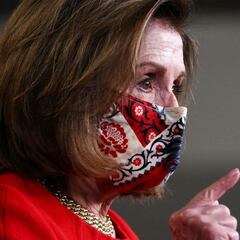$300 unemployment benefits boost: rundown on the bipartisan proposal
A cross-party group of Senators has tabled a coronavirus relief bill which would see an additional $180 billion made available to help those who have lost their jobs during the pandemic.


Unemployed Americans could be set to receive an extension of their $300-a-week federal supplement if the bipartisan coronavirus support package is agreed before Congress breaks for Christmas at the end of next week.
A summary of the ‘Bipartisan Emergency COVID Relief Act of 2020’ released on Wednesday has confirmed there would be provision for the additional unemployment benefits to be continued after the CARES Act expires in late December.
What unemployment benefits are included in the bipartisan relief bill?
The $908 billion relief bill would include 16 weeks of $300 weekly payments for out of work Americans, lasting until April, to act as a stop-gap while further financial support is being negotiated. This would be paid on top of the normal state unemployment benefits, but is just half of what was being offered during the early months of the pandemic.
Our bipartisan working group came together to come up with a #COVID relief package after months of negotiations failed to produce a deal. Now, we’re closer than we’ve ever been to providing support to Americans who need it most. We’re not going to stop until we deliver for them. pic.twitter.com/4qfaYMDZTs
— U.S. Senator Bill Cassidy, M.D. (@SenBillCassidy) December 10, 2020
The bipartisan bill would cover “all pandemic unemployment insurance programs”, meaning that support would be offered to a broad range of people. The Pandemic Unemployment Assistance would provide vital support for self-employed, gig, freelance and other workers unable to claim traditional state unemployment insurance. There is also Pandemic Emergency Unemployment Compensation, which facilitates an additional 13 extra weeks of state unemployment benefits if the usual period of support expires before the recipient is able to find work.
Existing unemployment benefits set end on 26 December
When the CARES Act was signed into law on 27 March 2020 it provided additional $600 weekly unemployment benefits for those who had been made redundant during the pandemic. In total the package cost the federal government $2.2 trillion, but the support it offered soon ran out. The initial $600 payments were replaced by a $300-a-week supplement during the summer, with the hope that a new deal would soon be agreed.
However attempts to reach a compromise in Congress have so far been fruitless and the $300 supplements will expire on 26 December. If nothing is agreed by that date, an estimated 12 million Americans will lose that additional federal support.
Another 853,000 Americans filed for first-time unemployment benefits last week on a seasonally adjusted basis, the Labor Department reports. It is the third increase in the past four weeks. @JChatterleyCNN reports. https://t.co/yDejnGq75M pic.twitter.com/Po1hxOMulB
— CNN (@CNN) December 10, 2020
This picture could get even worse if the job market recovery continues to slow as it has done in recent months. Jobs growth have slowed month on month since June and the number of long-term unemployed (defined as jobless for at least 27 weeks) increased by 385,000 during November.
White House floats alternate proposal
The bipartisan package has found a good deal of support in Congress but Senate Majority Leader Mitch McConnell has resolved to block the bill from being put to a vote in the Upper House. McConnell has said that he wants a new relief bill signed before the end of the year but he is unhappy with the scope of the bipartisan deal.
Sen. Mitch McConnell's aides warned congressional leaders that Republicans are unlikely to support a proposed $908 billion bipartisan stimulus compromise. For months Republican reluctance has helped hinder an agreement on an economic recovery plan. https://t.co/DrzdAIvznR
— The New York Times (@nytimes) December 10, 2020
Related stories
In an attempt to appease all sides, Treasury Secretary Steven Mnuchin has proposed a $916 billion stimulus package on behalf of the White House. Despite being of roughly equal size financially, the content of the bill is very different and does not include an extension of the additional $300 weekly unemployment benefits included in the bipartisan proposal. There is some funding to prop up the unemployment provision but the $40 billion boost was called “unacceptable” in a statement signed by Speaker of the House Nancy Pelosi and Senate Minority Leader Chuck Schumer.
Instead, Mnuchin’s package would see a one-off payment of $600 sent to eligible Americans, similar to the $1,200 stimulus checks that were included in the CARES Act. This comes with the blessing of President Trump, who White House insiders claim is eager to secure another round of direct payments.

